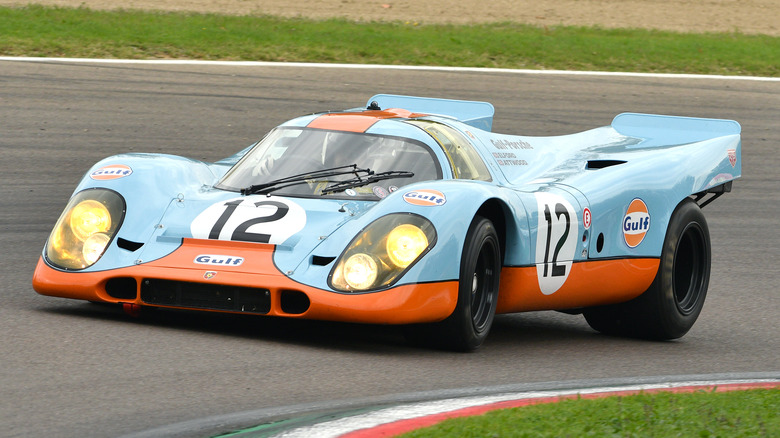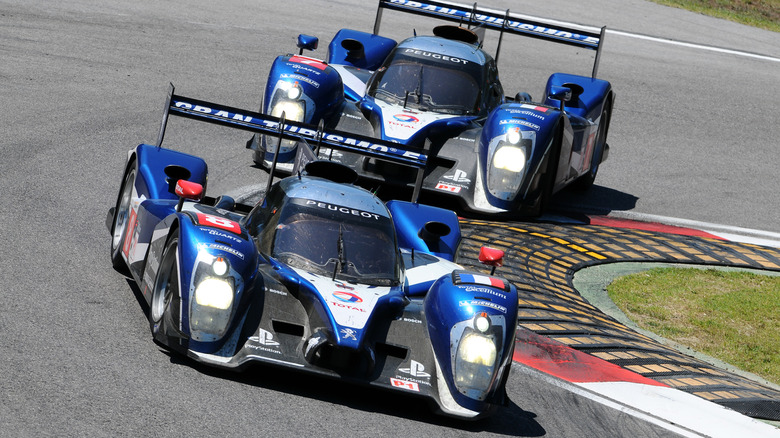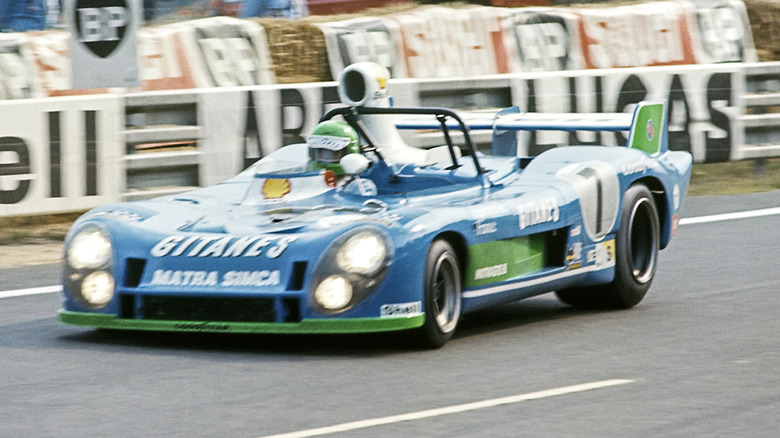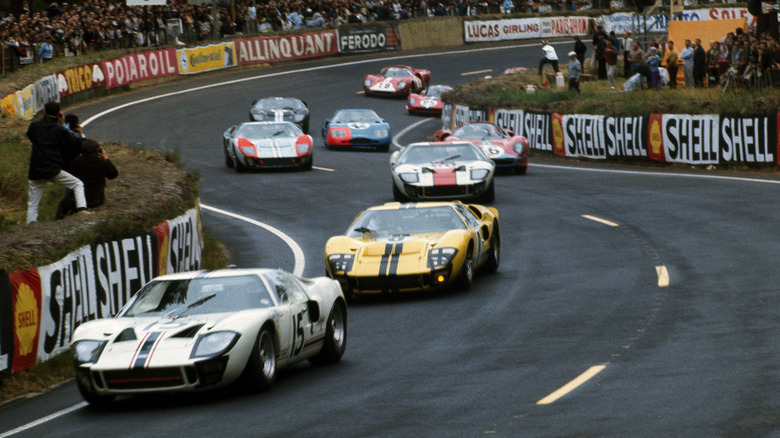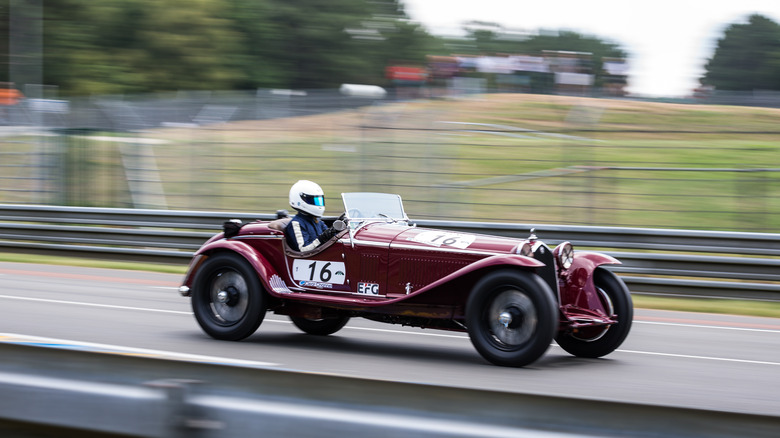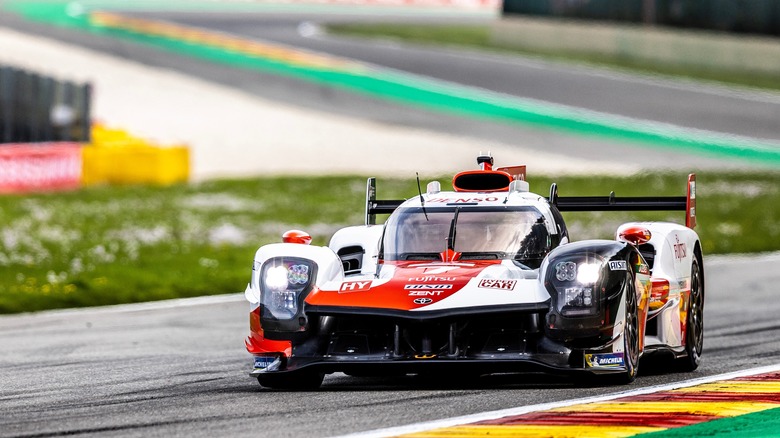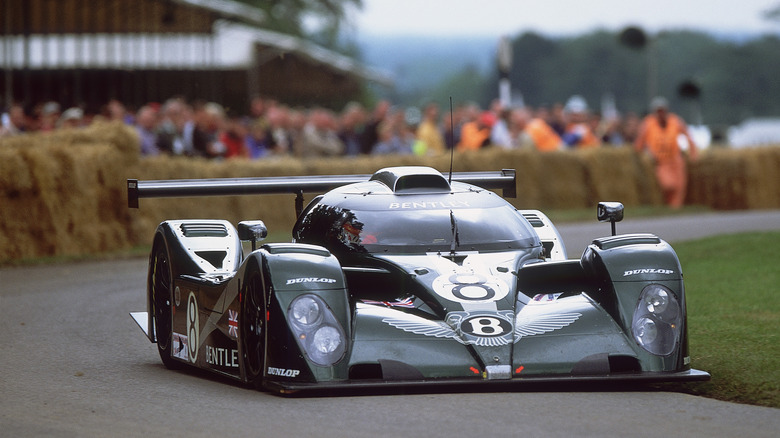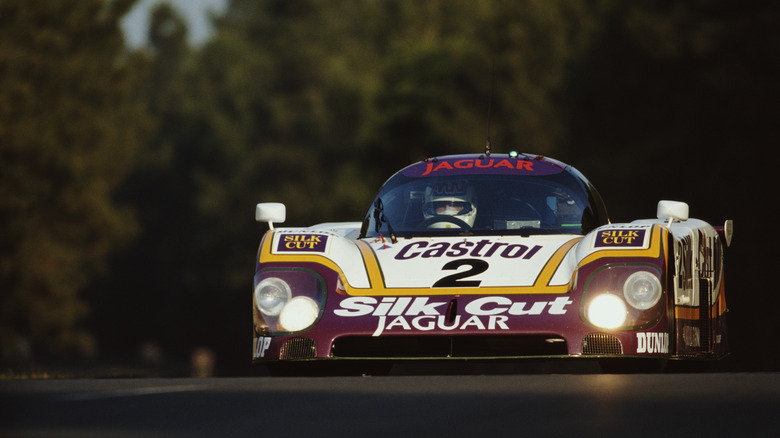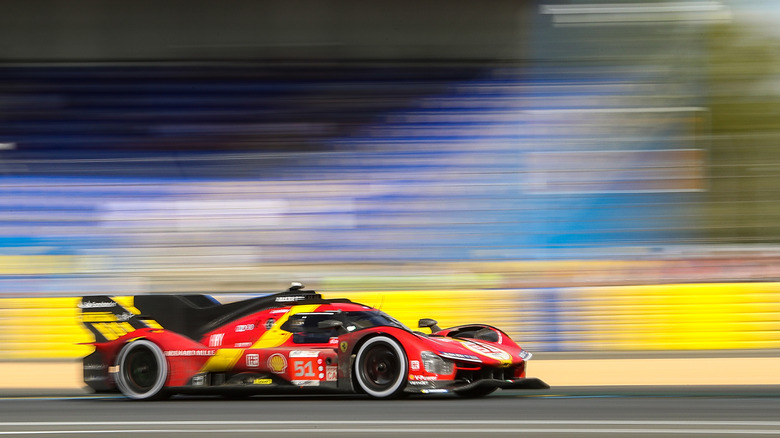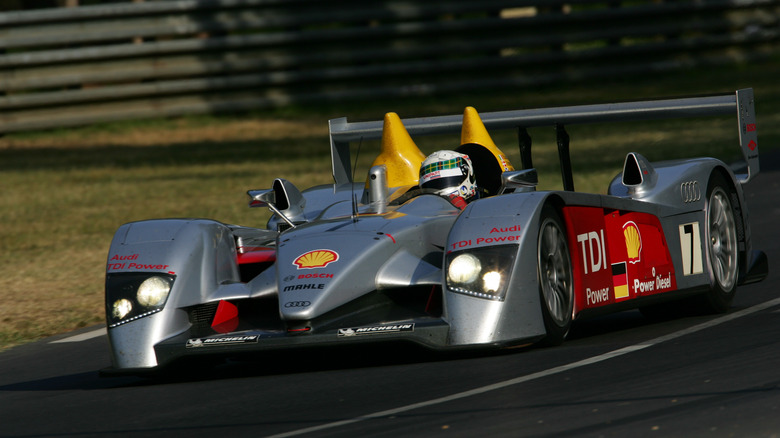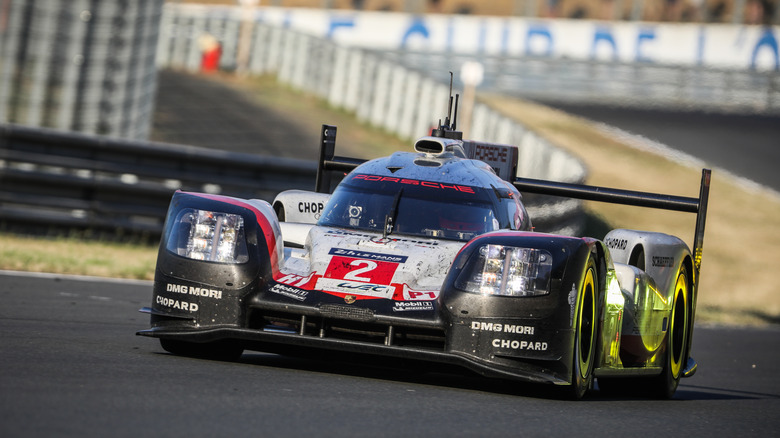10 Auto Manufacturers With The Most Wins At Le Mans, Ranked
A test of courage, skill, and engineering ingenuity and a demonstration of pure racing, the 24 Hours of Le Mans is probably the most legendary racing event in history. Throughout its 100-year-old history, it brought us mythical fights between greats — like the famed Ford vs. Ferrari rivalry — and even allowed some fringe technologies to climb on the pedestal, including rotary and diesel engines.
More than that, the 24 Hours of Le Mans race has always captured the true essence of racing. The Circuit de la Sarthe, where the race takes place, is one of the fastest courses in the world. Speed has always been the name of the game here, with the official record of 405 km/h (251.6 mph) achieved at the Mulsanne Straight in 1988. Overtaking is also par for the course at Le Mans, with chaos always being present on the field due to cars competing from different categories. Let's not forget the endurance factor -– the cars need to be pushed to 100% for 24 hours, and many great cars have lost the race due to reliability issues, sometimes just minutes from the finish.
Winning Le Mans is challenging, so which teams overcame the difficulties and amassed the most wins, and how did they get there? In this article, we will explore the 10 most successful auto manufacturers at Le Mans and tell you their story. Buckle up because it will be an action-packed journey through Le Mans history!
10. Peugeot: 3 wins
When a French automaker wins the 24 Hours of Le Mans race, it brings a sense of pride among home supporters. Peugeot was the last to bring joy to the French motorsport fans when it won the race in 2009. It did that with its 908 HDi FAP race car, which was powered by a turbodiesel engine. The 5.5-liter V12 unit purportedly produced around 700 hp and a monstrous 885 lb-ft (1,200 Nm) of torque, enough to beat the Audi R15, which was also powered by a turbodiesel engine.
Peugeot was even more successful by the end of the 1980s and the beginning of the 1990s. Notably, the WM P88 racecar powered by a 2.6-liter V6 Peugeot engine with two turbochargers achieved the record-breaking speed of 251 mph (405 km/h) on the Mulsanne straight in 1988. The WM P88 finished fourth, but its record will probably stay unbroken since Le Mans officials added two chicanes to the Mulsanne straight to slow cars down in 1990.
The Peugeot Talbot Sport team was much more successful in 1992 and 1993 when it won the race with its 905 racecar. The French team beat Toyota and its lightning-fast TS010 car in both races, with the team taking over all three spots on the pedestal in a first-second-third place win. The 905 was a very advanced car for the era, with a streamlined body and a naturally aspirated 3.5-liter V10 producing around 650 hp. It also weighed only 1,653 lbs (750 kg) – much lighter than today's Le Mans hypercar's minimum weight of 2,270 lbs (1,030 kg).
9. Matra-Simca: 3 wins
Matra and Simca are two now-defunct French automakers, but once, they fought together on the big stage at Le Mans and won the race three times in a row. Matra was the driving force because, as a company, it mainly produced affordable and lightweight sports cars, so the Le Mans race was seen as a way to showcase its engineering prowess.
The MS 670 car that dominated the race in 1972, 1973, and 1974 was designed by Bernard Boyer and Jean-Louis Cassin. It came with an angry-sounding 3.0-liter V12 engine designed by Matra, producing 450 hp and 236 lb-ft (320 Nm) of torque. Not hugely powerful, sure, but these engines were also designed to be reliable. Crucially, Matra Simca opted for a fiberglass body, which brought the MS 670 down to 1,528 lbs (693 kg) and allowed the car to reach 199 mph (320 km/h) on the Mulsanne straight.
Behind the wheel of Matra Simca's winning MS 670 car were legendary racing drivers, such as Henri Pescarolo and Graham Hill in 1972 as well as Pescarolo and Gerard Larrousse in 1973 and 1974. Moreover, the team won against stiff competition, beating the Porsche 908 L for a 1-2 victory in 1972, the Ferrari 333 SP in 1973, and the Porsche Carrera Turbo in 1974. Matra Simca didn't return to Le Mans after its threepeat in the 1970s, but its loud V12 supercar still inspires young engineers and fans of the sport in general.
8. Ford: 4 wins
Although Ford is not the most successful automaker in Le Mans' history, its David versus Goliath story in the 1960s is by far the most popular in pop culture. Namely, the American brand entered Le Mans to race against Ferrari, and against all odds, it won four consecutive times from 1966 to 1969. Not only that, but Ford's legendary V8-powered GT40 racecar was dominant at the race in 1966 with a first-second-third place finish.
However, Ford's Le Mans story wasn't without setbacks. In fact, in the first two years the company entered Le Mans (1964 and 1965), its official cars didn't even finish the race. The problem was within the gearbox and head gasket, which led to reliability issues during the race. One GT40 in 1964 even caught fire. Ford's dream of winning the race seemed impossible, but the team of engineers behind the car, led by Carroll Shelby, knew it had a winner on their hands -– all they needed was to fix the reliability issues.
So, in 1966, Ford finished with all its three GT40 MKII cars crossing the line together to victory. It was a moment of pride for Ford and America, as Le Mans has mostly been dominated by European brands before. Still, it wasn't without controversy; by ordering the #01 car (Ken Miles and Denis Hulme) to wait for the other two cars, the team essentially gave the victory to its 02 car, driven by Bruce McLaren and Chris Amon. A blemish, for sure, but it was not enough to overshadow Ford's epic victory.
7. Alfa Romeo: 4 wins
Like Ford, Alfa Romeo amassed all four of its Le Mans wins in a four-year period between 1931 and 1934. The company raced at the Circuit de la Sarthe many more times but was never as successful as it was with its famous 8C 2300 racecar. A compact and lightweight machine weighing around 2,161 lbs (980 kg), the 8C 2300 racecar was built by coach builders Touring and Zagato. Interestingly, there was also a street-going version of the car, which we today would call a homologation special.
The most unique part of the 8C 2300, though, is definitely the straight-eight engine. Situated behind the front wheels for better weight distribution, the 2.4-liter unit provided 155 hp, aided by a roots-type supercharger. It's not very powerful by today's standards, but still enough to push this open-top racecar to 127 mph (205 km/h). Crucially, it was powerful enough to beat the mythical Mercedes-Benz SSK in 1931, one of the best German cars ever made, which had a much larger 7.1-liter supercharged inline-six engine. Alfa Romeo was so dominant, in fact, that it took a first-second place victory in 1932 and managed a first-second-third place finish in 1933.
The 8C 2300 has put Alfa Romeo's name on the racing scene, making it one of the brands most synonymous with a pure driving experience. It was also the car that brought legendary driver Tazio Nuvolari his only 24 Hours of Le Mans victory in 1933.
6. Toyota: 5 wins
Toyota's story at Le Mans is a pure thriller, as it has everything from big expectations to heartbreaking losses, and dominant wins. The Japanese company still competes in the race, losing it in 2023 to Ferrari when its GR010 hypercar was slapped with a 37-kg weight penalty just nine days before the race because of its dominance in the WEC championship.
Toyota's first entry at the 24 Hours of Le Mans race was the 85C car, which had a 2.1-liter four-cylinder turbocharged engine, finishing 12th. Still, that was only a hint of what was to come -– the company's TRD (Toyota Racing Development) program was busy working on a Group C car designed to win the race. It all culminated with the notorious TS010 racecar, which had a V10 engine and produced rib-breaking downforce. However, that was only enough for second place, with the subsequent TS020 suffering the same fate.
The Japanese automaker returned to Le Mans in 2012 with a hybrid, believing it would finally bring home the victory. Toyota's hybrid LMP1 cars were fast, with the TS040 Hybrid taking the pole position in 2014. Still, the team couldn't convert the speed to victories, suffering one of the biggest heartbreak moments in 2016, when the #5 TS050 racecar lost just a few minutes before the end after leading for most of the race's duration.
Toyota's misfortunes finally ended in 2018, when the automaker won the 24 Hours of Le Mans race for the first time with a first-second place victory. The company's domination continued in the next four years, only to be interrupted by Ferrari in 2023.
5. Bentley: 5 wins
Bentley was a force to be reckoned with in the initial phase of the 24 Hours of Le Mans race, winning five races between 1924 and 1930. As a result, the city of Le Mans even renamed a street Rue des Bentley Boys, honoring the team's contribution to popularizing the race. Today, most associate Bentley with ultimate luxury, but speed has always been a part of the equation with the British brand. In fact, its founder, Walter Owen Bentley, thought that racing was an important pillar in the brand's ascension to the top of the industry. As a result, the company was a mainstay in racing in the 1920s, even competing in the Indianapolis 500 race in 1922, finishing 13th.
Still, that was only the warm-up phase, as W.O. Bentley had his eyes on the 24 Hours of Le Mans. Initially, he thought that finishing the race was impossible; however, after Bentley's 3-liter racecar finished the race in 1923 and set a new lap record, he put most of the company's efforts into winning there. It immediately paid off, with Bentley being triumphant in 1924 with the 3-Liter. The company repeated its success in 1927 with the same car, then won in 1928 with the 4.5-liter. Finally, in 1929 and 1930, Bentley won with the Speed Six.
Bentley returned to Le Mans in 2001, aiming to win the race once again. In the first two tries, Bentley's EXP SPEED 8 car lost the race to the dominant Audi R8, finally winning the race in 2003 with a first-second place victory.
4. Jaguar: 7 wins
Apart from participating in Formula E, Jaguar is not present in many major racing events today. However, the company was a mainstay at the 24 Hours of Le Mans race in the 1950s. The company won five times during that decade, even claiming a first-second-third-fourth place finish at the 1957 edition. The car that was so dominant that year was the D-Type, succeeding the XK 120 C which won the 1951 and 1953 editions.
The D-Type was an attractive, streamlined car designed with aerodynamics in mind. One of its characteristics was the rear shark fin, which stabilized the airflow at higher speeds. Thanks to the aerodynamic body, the D-Type achieved 178 mph (286 km/h) in testing, although there was much more to the car than just achieving high speeds. Namely, the D-Type was built from magnesium alloy to reduce weight and enhance rigidity, while the dry-sump lubrication ensured a lower center of gravity. Meanwhile, Jaguar placed a 3.5-liter inline-six under the front bonnet, producing 250 hp and 240 lb-ft (325 Nm) of torque.
Jaguar returned to Le Mans in the 1980s with the XJR program and won the race again in 1988 with the XJR-9 LM. This was a serious 7.0-liter V12 machine that packed 750 hp and 611 lb-ft (828 Nm) of torque while weighing a measly 1,942 lbs (881 kg). Jaguar won for the seventh time in 1990 with the XJR-12 car, which had a slightly detuned engine, though it was slightly longer, giving it better aerodynamics.
3. Ferrari: 10 wins
Ferrari was once a brand synonymous with racing, participating in most major racing events, like Formula 1 and Le Mans. While Ferrari was absent at Le Mans with a prototype from 1973 to 2023, its supercars competed in the lower-tier GT categories. However, the company decided to return to the legendary race with a new prototype car in 2023 and won in its first attempt, fending off the favorite Toyota Gazoo Racing Team for its 10th Le Mans victory.
The Ferrari 499P car not only beat its Japanese rival but also Porsche, Cadillac, and Peugeot. Powered by a 670-hp hybrid powertrain consisting of a 3.0-liter twin-turbo V6 and an energy recovery system producing 269 hp, the 499P showcased speed and reliability like no other hypercar on the field – similar to what the brand did in the 1950s and 1960s. Then, Ferrari showcased its racing prowess with exotic machines, such as the beautiful 166 MM (1949) and the 5.0-liter V12-powered 375 Plus (1954) that achieved a top speed of 174 mph. No to mention the 250 Testa Rossa that won the race in 1958, 1960, and 1961, powered by a 3.0-liter V12 producing 300 hp.
Still, perhaps the most legendary Ferrari to win the Le Mans race was the 275 LM, which helped Ferrari comprehensively beat Ford in 1964 despite having a much smaller 3.3-liter V12 compared to the 7.0-liter V8 of its American rival.
2. Audi: 13 wins
Although Audi only entered the 24 Hours of Le Mans race in 1999, it has amassed 13 victories to date, utterly dominating the race during the first 15 years of this century. The company was so good at making Le Mans prototypes that it finished the race in third and fourth place in its first attempt and then accomplished a first-second-third place win the next year.
The car that allowed Audi to dominate the first race of the century was the open-top R8, powered by a 3.6-liter twin-turbo V8 producing 610 hp and 516 lb-ft (700 Nm) of torque. The Audi R8 continued with its superiority with wins in 2001 (first and second), 2002 (first-second-third), and 2004 (first-second-third). The same car won again in 2005, though it was as a private entry (Champion Racing), not supported by Audi.
In 2006, though, Audi did the unthinkable and entered the Le Mans race with a turbodiesel prototype, the R10 TDI. The company won right away, thanks to the diesel's low fuel consumption and high torque. The 5.5-liter V12 unit was a technological tour de force with direct injection and two turbochargers, producing 650 hp (800 hp in a 10-second overboost). However, its torque figure is far more impressive at 811 lb-ft available from only 3,000 rpm!
Audi's turbodiesel prototypes went on to dominate the race in subsequent years. The company entered the 2012 event with the upgraded turbodiesel hybrid R18 e-tron Quattro with a 3.7-liter V6 engine and won the race. The German company won again in 2013 and 2014, though it lost to Porsche's gas-powered 919 Hybrid in 2015.
1. Porsche: 19 wins
With 19 wins at the 24 Hours of Le Mans, Porsche is by far the most successful automaker in the race's history. The German luxury brand is so synonymous with the race that it has been a contender in at least one class from 1951 until today. Porsche also gathered more than 100 wins in various class categories.
However, Porsche's first overall win came in 1970 with the legendary 917 closed-top prototype. This racecar was far ahead of its time, with a modern aerodynamic design and a 4.5-liter flat-12 engine producing 580 hp. Later that year, Porsche bored the engines to 5.0 liters and increased the output to 600 hp, allowing the 917 to hit 62 mph (100 km/h) in just 2.7 seconds, despite it having a five-speed manual! Still, the 917 showed its true color in 1971, where it won, averaging 138 mph (222 km/h), covering 435 miles (700 km) more ground than the previous year.
Porsche then won the 1976 and 1977 races with the open-top 936 prototype, known for its huge over-head air intake. Then, in 1979, the brand entered the race with the fabled 935 Moby Dick prototype, famous for its long and streamlined rear end accompanied by a huge spoiler. During the 1980s, Porsche again dominated endurance racing with the 956, which had a first-second-third place victory on its first attempt in 1982.
Porsche's last superiority at the Le Mans race was in 2015, 2016, and 2017, when the German company entered the F1-beating 919 Hybrid racecar, producing a dizzying 1,160 hp!
